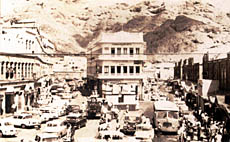
Aden Police During Colonial Times [Archives:1999/01/Culture]
January 4 1999

Dr. Salah Haddash, Yemen Times Managing Editor, talked to Mr. Willis and filed the following interview.
Q: How did you first think about doing a research on late colonial Aden?
A: It was almost by accident, while I was doing my research in the Library of Congress and was looking into references on the social history of the Arabian Peninsula. I found a series of colonial annual reports on the police, health services, etc. This directed me to look at Aden specifically, and Yemen in general.

A: There were two branches of the police; a civil branch and an armed branch. The civil branch had to do police functions, which were walking in the streets unarmed, and making civilians obey the law.
The second branch, the armed police, were trained along military lines, armed with rifles. They were housed in military barracks along the main road out of Crater. Their duties included crowd control, riot control, dispersing labor demonstrations, etc.
Q: In what events was that Aden police force employed?
A: In 1947, it was the announcement of the partition of Palestine. This was compounded by the general post-war economic depression. It was a large-scale riot that ended up with focusing on the Jewish residents of Aden. Their stores, houses and so on, were looted and burnt by fanatics.
In 1948, the cause of the riots seemed to be the indiscriminate use of firearms among the crowds. Some died and a number of people were injured.
A large number of Jews and Arabs as well fell prey to the riots. The number of people injured by policemen is not fully known. People interviewed after the events were mainly Arabs, who came from the neighboring protectorates to the colony of Aden. On the other hand, a large number of the rest were either national Somalis or Indian, Baha’i followers, Parsees, Sikhs or Jains.
Q: Who were the elite of the police force?
A: The highest ranks were taken by the British. But among the inspectors were professional Arabs, Somalis, Indians, and so on.
There were six police divisions in the British colonial system of Aden: for crowd control, riots, labor disturbances, morals (including qat banning, prostitution, gambling), city (keeping the streets clean), and traffic.
British citizens in Aden used to complain that Arabs did not know how to drive. Driving regulations were rather complex then. Policemen were always working so hard to control the traffic. There were carts at that time, some camels, donkeys. But there were lot of cars by 1940s, the 1950s and 1960s.
Q: What were the main crimes dealt with by the Aden police?
A: From the annual reports, we can see that major crimes were things like smuggling, theft, murder. For instance, at least an average of 5 murder cases were recorded every year in the period from 1947 to 1960 in the colony of Aden alone.
Q: What about Qat?
A: There was really no problem with Qat until 1957, when the legislative council, largely consisting of middle-class people, decided to banned qat. The British agreed that this includes the sale and use of Qat within the boundaries of the colony of Aden.
It was a failure, as a report published in 1958 described it. The police did not have enough people to control the border between Lahj and Aden. A large number of people complained about it. Men went every day out of Aden to chew Qat.
People started using refrigerated boats to import it from Harar in Ethiopia, so the legislation had really no impact. During that period a lot of qat was coming from the Abyssinian highlands.
Q: Was there any corruption in the Aden Police?
A: Some people were disciplined because of accepting bribes. That was the biggest complaint by people against the police. The trouble with recruiting police and the chief of police specifically was, at one point, lack of good housing. There was a shortage in housing which was always not enough for the police. Policemen wages were not particularly high.
Q: What is the most interesting thing you found through your research, something you did not expect?
A: What was not expected is the daily resistance to police. For instance, people would not cooperate with the police when they are trying to do investigation for a homicide case, say.
——
[archive-e:01-v:1999-y:1999-d:1999-01-04-p:./1999/iss01/culture.htm]


